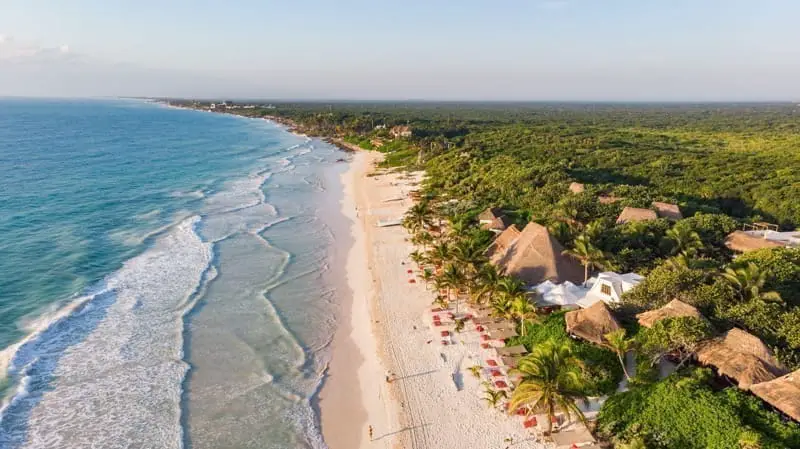How to Buy a Property in Mexico?
If you are considering buying a property in Mexico, you are not alone.
Many people worldwide, especially from the United States and Canada, are attracted to the country’s beautiful beaches, vibrant culture, and affordable real estate prices.
Before you search for the perfect property, it is essential to understand the legal framework and the buying process in Mexico.
Why Buy Property in Mexico
There are many reasons why buying property in Mexico is a good investment. The country’s booming tourism industry, warm weather, and low cost of living make it an attractive destination for retirees, expats, and vacation home buyers.
Mexico’s real estate market is still recovering from the 2008 financial crisis, which means many affordable properties are available for sale.
Legal Framework for Buying Property in Mexico
Before you buy a property in Mexico, it is essential to understand the legal framework.
Mexico has strict laws that regulate the sale of property to foreigners, and there are some restrictions on where foreigners can buy property.
Restricted Zones
The Mexican Constitution prohibits foreigners from owning land within 50 km (31 miles) of the coast or 100 km (62 miles) of the border.
These areas are known as restricted zones. However, foreigners can still buy property in these zones by setting up a trust, known as a fideicomiso.
Trusts
A fideicomiso is a legal instrument that allows a foreigner to hold title to the property in restricted zones.
The trust is established with a Mexican bank, which acts as the trustee. The bank holds the title to the property on behalf of the foreigner, who is the trust beneficiary.
The beneficiary has all the ownership rights, including the right to use, sell, or rent the property.
Notario Publico
In Mexico, property transactions are handled by a notario publico, a government-appointed lawyer.
The notario publico is responsible for ensuring that all the legal requirements are met, including verifying the property’s title and conducting a title search.
They also handle the transfer of funds and drafting the purchase agreement.
Finding the Right Property
Once you have a good understanding of the legal framework, you can start your search for the perfect property. Here are some tips to help you find the right property:
Researching the Market
Before you start looking at properties, it is essential to research the market. This will give you an idea of what is available and the prices. You can find information online, in real estate magazines, or by talking to local real estate agents.
Working with a Reputable Real Estate Agent
Working with a reputable real estate agent familiar with the local market is essential. A good agent will be able to help you find properties that meet your criteria, and they can also provide valuable advice about the buying process.
Viewing Properties
Once you have identified some properties you are interested in, it is time to view them in person. This will give you a better idea of the property’s condition, location, and surroundings. It is also an excellent opportunity to ask questions and get a feel for the local community.
The Buying Process
Once you have found the right property, it is time to start the buying process. Here are the steps involved:
Making an Offer
You can make an offer once you have found a property you like. The offer should include the purchase price, contingencies, and the closing date. The seller can accept, reject, or counter your offer.
Signing the Contract
If your offer is accepted, the next step is to sign the purchase agreement. This legally binding contract outlines the terms of the sale, including the purchase price, the closing date, and any contingencies.
Payment and Financing Options
In Mexico, it is common for buyers to pay for the property in cash. However, financing options are also available, including mortgages and owner financing.
Closing the Deal
Once the purchase agreement is signed, closing the deal is next. Here are the steps involved:
Title Search and Due Diligence
Before the closing, the notariopublico will conduct a title search and due diligence to ensure that the property is free of liens or encumbrances. This is a crucial step to ensure you buy a property with a clean title.
Closing Costs
Closing costs in Mexico can vary depending on the property’s value and location. Some of the costs you can expect to pay include notary fees, appraisal fees, and transfer taxes. It is essential to budget for these costs when planning your purchase.
Is Mexico cheap to buy a house?
Mexico can be an affordable place to buy a house, with prices varying significantly depending on the property’s location, size, and amenities. Some key things to keep in mind:
- Mexico has a wide range of home prices across the country. Coastal areas like Cancun and Los Cabos typically have higher home prices due to tourism, while inland cities and rural areas are more affordable.
- Home prices are generally cheaper in Mexico than in the U.S., especially for larger homes. You can find nice houses or condos starting around $100,000 to $200,000 in many parts of the country. High-end properties can still cost millions of dollars.
- Property taxes are typically lower in Mexico than in the U.S. However, mortgage interest rates in Mexico tend to be higher, around 8% to 12%.
- Buying a house in Mexico requires a type of bank account called a FIBRA account, which allows foreigners to own property. You’ll also need a CURP number, Mexico’s tax identification number.
- There can be extra costs associated with owning a home in Mexico, like homeowners association fees if applicable, property management fees if renting the home, and higher utility bills. Maintenance and repair costs are also things to consider.
- Safety and security are always important factors to research when buying property in Mexico. Certain areas have higher crime rates than others.
Is it wise to buy property in Mexico?
There are pros and cons to buying property in Mexico:
Pros:
Affordable real estate. Property prices in Mexico are generally much lower than in the U.S., especially for larger homes and beach properties. This makes it an attractive option for those seeking an affordable second or retirement home.
Foreign ownership permitted. Foreigners are allowed to purchase property in Mexico for personal use, which opens up options unavailable in some other countries.
Potential investment opportunity. For those planning to rent the property for part of the year, Mexico’s tourism industry often demands vacation rentals. Property values have also generally appreciated over time.
Tax benefits. Mexico has various tax incentives to attract foreign investors, including tax breaks on capital gains from property sales.
Cons:
Security concerns. Certain areas of Mexico have higher crime rates than the U.S., so safety and security must be evaluated for any specific location.
Legal complexity. Specific legal requirements and restrictions on foreign property ownership make the process more complex than buying domestic real estate. Working with experienced experts is recommended.
Property management challenges. Managing property from abroad can be difficult, requiring strong property managers and effective communication systems.
Repairs and maintenance. Ongoing issues like mold, termites, and storm damage are more common and severe in Mexico’s climate, driving up long-term costs.
Volatility risk. Mexico’s economy and currency have sometimes been volatile, which could impact property values, costs, and exchange rates.
How to Buy a Piece of Neighbors Property?
Best Real Estate Broker In Mexico
There are many good real estate brokers in Mexico, depending on the area you’re looking to buy property. Here are some of the top companies:
FrescHomes – A well-established real estate brokerage with offices across Mexico. They specialize in high-end and luxury properties.
Casas.com – One of Mexico’s largest real estate brokerages, with over 35 years of experience. They have a large inventory of properties nationwide.
Condo.com.mx – Specializes in apartment and condo listings, particularly in popular ex-pat destinations like Mexico City, Guadalajara, and coastal cities.
Vivanuncios is a giant online real estate listing platform connecting buyers and sellers across Mexico. They have many brokerage partners.
Century 21 Mexico – Part of the global Century 21 franchise, they have over 100 offices across Mexico focusing on mid-to-high-end properties.
Coldwell Banker Mexico – Another sizeable global brand, they have well-connected agents with expertise in properties where foreigners can buy.
BetterHomes – A leading real estate brokerage mainly focused on Mexico beach properties and vacation rentals like the Yucatan Peninsula and Riviera Maya.
Fine Properties – Specializes in luxury properties with listings mainly in Mexico City, Acapulco, Puerto Vallarta, San Miguel de Allende, and other top destinations.
FAQ
What is a fideicomiso?
A fideicomiso is a trust that allows a foreigner to hold title to the property in restricted zones in Mexico.
What is a notario publico?
A notario publico is a government-appointed lawyer who handles property transactions in Mexico.
Can I get a mortgage in Mexico?
Yes, financing options are available for buying property in Mexico, including mortgages.
What are the closing costs in Mexico?
Closing costs in Mexico can vary depending on the location and property value. Some of the costs you can expect to pay include notary fees, appraisal fees, and transfer taxes.
Can I buy property in Mexico if I am not a citizen?
Yes, foreigners can buy property in Mexico, but there are restrictions on where and how to hold the title.
Conclusion
Buying a property in Mexico can be a significant investment, but it is essential to understand the legal framework and the buying process.
By doing your research, working with a reputable real estate agent, and following the proper steps, you can find the perfect property and enjoy all the benefits Mexico offers.














